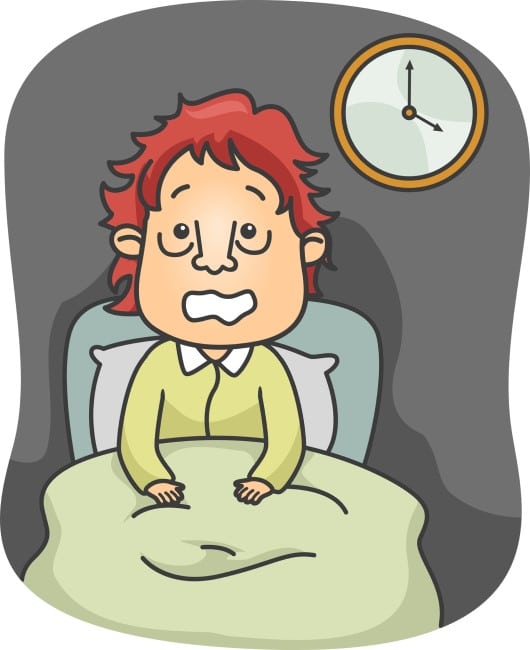
9 things to try when too much light is keeping you awake
By Jason Wooden, PhD | October 5, 2020
Humans are incredibly sensitive to light around bedtime and some people are more sensitive than others.
Excessive bedroom lighting can signal the body’s sleep-wake clock it’s time to be awake when you should be sleeping.
Depending on your situation, there are plenty of remedies including a simple sleep mask, black out curtains, and things many people overlook.
Bad news and good news if too much light is keeping you awake
Okay, which do you want first – the good news or the bad news?
It’s understandable if you’re frustrated because excessive night time light is ruining your sleep.
And it’s ruining your days…
We’ve all been there at one point, whether it’s light from a hallway or a street lamp. You settle down looking forward to a great night of Zs and find it almost impossible to drift off to sleep.
Talking about feeling miserable…
Unfortunately, we live in the modern age where there’s abundant electricity. Staying up and doing things after the sun sets has become the norm.
In many areas, light pollution is a fact of life, especially if you live in a city.
Did you know a third of adults worldwide struggle with sleep for various reasons? Excessive light too late in the evening is likely a part of the problem for many.
The good news is unlike other sleep issues, this one is fixable.
We know why it happens and how to prevent it.
So, let’s take a quick look at what night time light does to your body and some practical ways to keep your sleep on track.
What exessive night time light does to your body’s clock to keep you awake
The main reason excessive night time lighting keeps you from feeling sleepy is that it confuses your body.
The human body is wired to be in tune with the natural cycles of day and night. During the day, we’re supposed to be awake and active. At night, we’re supposed to be still and sleeping while the body refreshes itself.
The sleep-wake clock is what tells the body when it’s time to sleep and when it’s time to be awake. It’s stays in tune with day and night through sleep inducing hormones such as melatonin.
Normally, sunlight signals the sleep-wake clock through your eyes to stop making melatonin which is why it falls during the day and creeps up as it gets darker.
Light at the wrong time, such as bedtime, signals your body to be awake even though its night time.
So, that’s why too much light can cause problems for sleep – it’s working against the way our bodies were designed.
Besides keeping you awake, it can also affect your sleep quality during the night and cause you to wake up way earlier than you want.
Why light is more of a problem for sleep for some people than others
Too much night time lighting is more of an insomnia risk for some sleepers than others.
It turns out that some people are way more sensitive than others. That means their melatonin is more suppressed by light.
In a recent study, 55 adults were exposed to varying amounts of lights in the evening and tested for their melatonin levels.
The researchers found very large differences in light sensitivity. For some people, it took as much as 50 times more light than others to suppress their melatonin.
They also found that around bedtime humans are incredibly sensitive to even low lighting.
As I mentioned before, this is just the way our bodies are wired.
This could also be why you’re more sensitive to light around bedtime than a spouse, roommate, or other people you know.
The 9 things worth a try if too much light is keeping you awake
Okay, now that you know what’s happening, let’s look at what you can do.
Fortunately, there are plenty of options, depending on where the unwanted light is coming from:
- Is it indoor or outdoor light?
- Is it something you’re doing or someone else?
- Is the light coming from more than one source?
Depending on your situation, the remedy may involve a simple fix or something more involved where you have to mix and match:
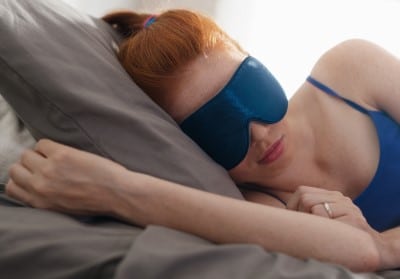
1) Sleep mask
I put this on the list first for obvious reasons – it’s cheap, low fuss, and low tech.
They’re lots of options, just make sure you get something that’s strong enough to block out as much light as needed. I’ve listed a couple of options here.
For those who may find this remedy uncomfortable, read on…
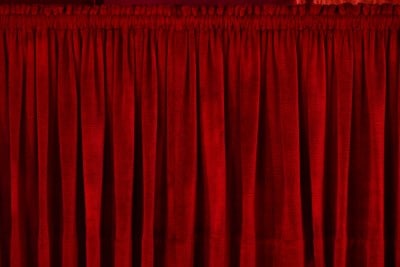
2) Heavy drapes
This will certainly cost more than a sleep mask and will require some setup. However, it’s a great solution if you’re dealing with excessive light coming in to your bedroom from street lights or a way too early sunrise.
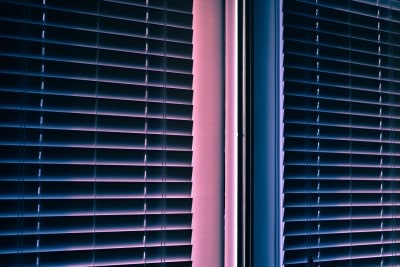
3) Blinds
If you’re not the drape type, blinds are a nice alternative. Be sure to get some blinds that are made with the right material and thickness to do the job.
(Those thin light colored blinds will only help you so much!)
One possible downside is leakage of light around the edges. If this becomes an issue, try combining curtains with blinds.
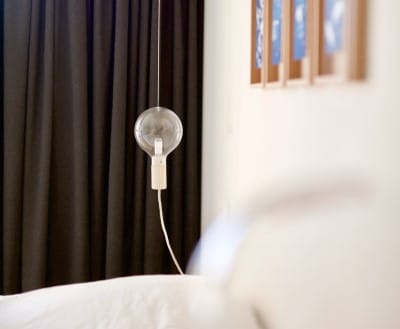
4) Dark out curtains
More expensive than heavy drapes, these curtains are made with fabric designed to optimally block outside light.
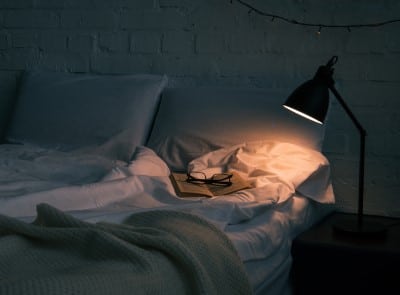
5) Switch your roommate to a low light lamp or book light
You may have a bedmate or roommate that likes to stay up later than you reading. If this is the case, ask them to try using a lower light option.
You can find small dimmable bedside lamps online and at your local department store. There are also unobtrusive compact book lights they can attach to their bed or directly to a book.
Be sure to look for something that’s “soft” and more on amber side than white. Bright white light, which is more on the blue wavelength side, is known to make it harder to fall asleep.
Better yet, find them something with blue light blocking.
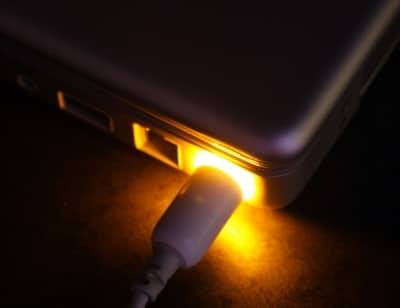
6) Protect from electronics
These days many bedroom electronics pollute your bedroom with night time light. Turn off or unplug anything you really don’t need.
You may want to cover up bright LED lights from powered units if its safe to do so. You can try black led blocking tape.
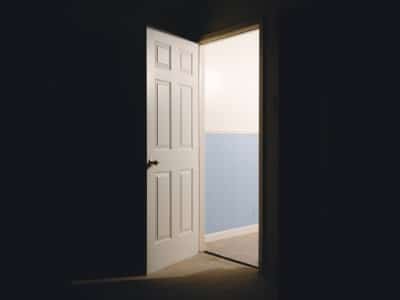
7) Block out the light coming through a door
Sometimes closing your door is not enough and light can still slip through the cracks.
If you can’t block the light at its source, you may need to hang a black out curtain big enough to cover your door and the frame.
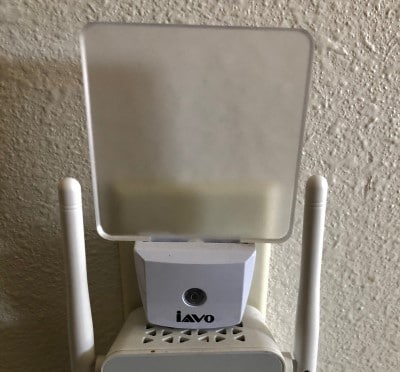
8) Switch to amber night lights
There are practical reasons to have a night light, especially if you’re an older adult concerned about safety.
Some night lights are pretty bright, especially the LED type. Besides being bright, they emit blue wavelength light which is bad for sleep.
You can try motioned activated night lights that will only turn on when you get out of bed. Alternatively, you can try keeping a red flashlight by your bed.
Fortunately, there are now amber night lights available online.
You’ll find some options listed here.
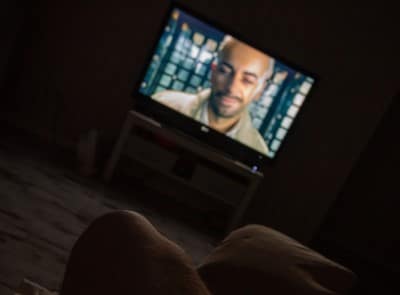
9) TV light
Many people like to watch TV in the bed. Some even like sleeping with it on.
Your TV is a major source of light pollution in the bedroom, especially since it emits bright blue wavelength light. Try turning it off at bedtime or programming it to go off after a certain time.
Other things you can do to help your sleep
It’s likely that too much light keeping you awake is not the only thing you’re up against.
Unfortunately, there are plenty of things that can cause problems for sleep and make a bad situation worse.
Some things you should seriously keep in mind include:
Avoid getting overstressed
Worrying too much when you’re already having a hard time falling asleep can make things worse. Stress and anxiety are major causes of insomnia. Find some relaxing activities to help your body transition to sleep.
Learn more:
How to go to fall sleep more quickly
17 Sleep friendly ways to pass the time
Practice good sleep hygiene
Sleep hygiene involves the every day habits that set the stage for quality sleep. Bad sleep hygiene can sabotage the other things you do to improve your sleep.
For better sleep, you should:
- keep consistent wake up & sleep times
- avoid naps
- exercise during the day
- avoid large meals, alcohol, or stimulants such as caffeine before bedtime
- maintain a regular bedtime routine
- avoid using TVs, laptops, or other electronics before sleep
- keep your bedroom dark, cool, quiet, & relaxing
Get a check up
It’s important to see a doctor, especially if your insomnia becomes a long-term problem.
Too many people aren’t aware that other health conditions can cause or worsen sleep issues. This includes things like chronic pain, heartburn, cancer, dementia, and asthma.
You may also be living with an undiagnosed sleep disorder such as obstructive sleep apnea.
Finally, some things can make you more sensitive to light. This includes issues and eye problems such as:
– allergies
– migraines
– dry eye
– corneal abrasion and ulcers
– eye diseases
If your bedtime issues with light is recent or it’s getting worse, be sure to see a doctor.
What to remember if too much light is keeping you wake:
- Our bodies are wired to be in tune with night and day
- Light can confuse the body’s sleep-wake clock
- There’re simple things you can do to block out light
- It’s worth seeing a doctor since other medical issues can make things worse
You may also be interested in:
Sources:
1. “Talking Points”, World Sleep Society website
2. “What is the Sleep/Wake Cycle?”, National Sleep Foundation website
3. “Sleep and Circadian Rhythm”, Endocrine Society website
4. Light and Cognition: Roles for Circadian Rhythms, Sleep, and Arousal. Front Neurol. 2018 Feb 9;9:56.
5. High sensitivity and interindividual variability in the response of the human circadian system to evening light, PNAS June 11, 2019 116 (24) 12019-12024
6. “Photophobia”, NIH website
7. “9 Health Issues That Can Cause Sensitivity to Light”, June 2018, Self.com
Connect with us:
About Us
Better Sleep Simplified® was founded as a place for you to get clear and well-researched information.
Our goal is to make sure you know about your options so that you take action sooner rather than later.
Check us out on YouTube:
Watch and Learn
Helpful sleep tips, interesting sleep facts and statistics you want to know about
Affiliate Disclosure
This site is a participant in the Amazon Services LLC Associates Program and other affiliate advertising programs designed to provide a means for sites to earn advertising fees by advertising and linking to them.
Important: BetterSleepSimplified.com is for informational purposes only and is not intended or implied to be a substitute for professional medical advice, diagnosis, or treatment. Always consult a physician for sleep and health concerns. See additional information.
